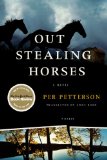Book Review: "Out Stealing Horses" by Per Petterson
December 1, 2008
If Out Stealing Horses were to be unraveled and performed as music it would sound something like Phillip Glass: modern, haunting, impenetrable. The sentences demand to be considered one word at a time, with minimal internal pause. Like arpeggios.
Yet minimalism is not a fair descriptor. The prose is not coy, but it is not basic, either. True to Nordic legacy, it is clean and reserved, but it becomes obvious that it’s a frozen, formal layer of ice over an emotional fjord of imponderable depth. The very paragraphs are walls that the protagonist, Trond, erects between himself and the reader. His own self-imposed isolation–he would say solitude, definitely not loneliness–is built into the sounds and shapes of the story.
In his sixties, three years a widower, Trond has packed up and left the city to live in a ramshackle cabin in the Norwegian countryside. Not quite a misanthrope, not exactly a curmudgeon, he insists that his need for human companionship is minimal. But his seclusion opens a link to memories: summer 1948, just after the war, a summer like a hinge in his life, a summer of death and complexity and love and abandonment.
Out Stealing Horses is, among other thing, a collection of echoes, balances. We meet two sets of twins: one from each pair will be shot to death. Jon, Trond’s young contemporary and partner in boyish summer hijinx, ripples with a submerged evil; yet the brutish, teenage German guards stationed in the village are likeable and naive. Trond’s boyhood fear of trees falling finally comes to pass, requiring help from someone of great coincidence who has the power to answer the greatest question of Trond’s life.
Petterson’s telling of the forests, rivers of Norway are wrenching in their clarity. The landscape doesn’t feel charming or sentimentalized. It feels like nature: cold and wet and beautiful, but not picturesque. The weather is harsh much of the time, the sky gray and dim, the great northern forest endless. It snows, lakes crust over with autumn ice.
The Nobel committee recently chastised American writers, insinuating that we won’t be seeing any Nobel winners until we emerge from our literary isolation: only a paltry percentage of the books we read are translated, and the general mood in the American literary style is to look within for inspiration. When I first heard this, I was offended. I thought the Nobel committee was being petty, not realizing that much of the reason we read so many American novels in America is because so many novels–and by extrapolation, so many good novels–were being written right here near us.
But reading this novel changed my viewpoint slightly. I was reminded that different language doesn’t just mean replacing sounds with slightly different sounds, it means a whole different structure. A whole different way to patch together sentences and thoughts. Different patterns of expression, and even thinking. While I have been assiduous in reading the Greek and Roman classics, I have not taken the care to balance my modern reading to have an international, worldly scope. I am inspired to change.
One Comment
Get the Book!
Buy the books mentioned in this post from Amazon.com now and help me maintain my rock 'n roll lifestyle.
Related Posts
- Book Review: "Daughter of Fortune" by Isabel Allende
June 9, 2009 - Book Review: "The Story of Edgar Sawtelle" by David Wroblewski
July 22, 2009 - Book Review: Middlemarch by George Eliot
November 7, 2008 - Book Review: “Great House” by Nicole Krauss
October 26, 2010 - Book Review: "Of Mice and Men", John Steinbeck
June 22, 2009


[...] Out Stealing Horses, Per Petterson – If I recommend one book to you this year, this is likely it. Its critical acclaim has been fairly universal. My review. [...]